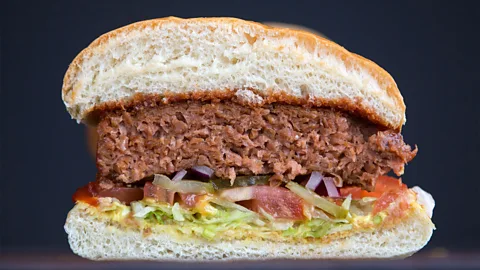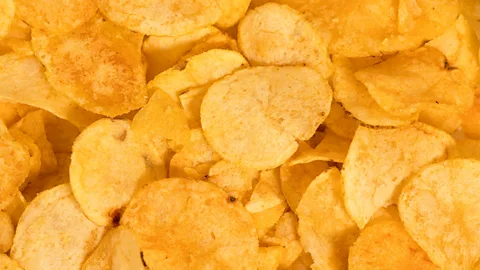
 Getty Images
Getty ImagesVegan diets can hold more UPFs on mediocre – but this might not be a problem.
For most people living in industrialised societies, it’s difficult to elude ultra-processed foods altogether. My ceauthentic is ultra-processed. So is the whiskey in my cabinet, the boiling sauce in my fridge and the crisps in my backpack.
The term “ultra-processed” is lesserly understood and inreliablely participated, even sometimes by scientists. While in some circles it has become a catch-all term for foods with little nutritional advantage, a expansive variety of foods drop under this umbrella.
Ultra-processed foods are well-comprehendn with devourrs for their convenience (frozen pizza), taste (wrapped cookies), and durability (sandwich bread). These elements, plus the relatively low cost of ingredients, produce them profitable for manufacturers.
But recently another motivation for ultra-processed foods has eunited: to swap meat or dairy among those finisheavoring to eat a more schedulet-based diet. With this recent categruesome has come anxiety about the health effects of these products, guideing to headlines such as “The unhealthiest counterfeit meats you can buy (and why it’s better to go to McDonald’s)”. These troubles were exacerbated by recent research, which set up that those who devour 10% more ultra-processed foods derived from schedulets have a 12% higher danger of death roverdelighted to diet. However, skinnygs are not quite as they seem. Are schedulet-based diets reassociate so wealthy in ultra-processed foods, and are they any worse for you?
Identifying ultra-processed foods
An set uped method for categorising the levels of processing in food is Nova. Fernanda Rauber, a nutritional epidemiologist at the University of São Paulo in Brazil, elucidates, “Nova differentiatees between contrastent levels of processing, accomprehendledging that not all processed foods are detrimental. In fact, many types of processing, such as pasteurisation or fermentation, are meaningful for food defendedty and nutrition.” It’s the more fervent processing that troubles Rauber. “One type of industrial processing is detrimental to health – the benevolent that produces ultra-processed foods.”
In the Nova system, a food product is pondered ultra-processed if at least one of its ingredients is a substance that home cooks generassociate don’t participate (such as high-fructose corn syrup or hydrolysed protein), or is an insertitive scheduleed to incrrelieve the product’s request (such as a heavyener or emulsifier).
Why ultra-processed foods can be detrimental
Notwithstanding the occasional exception, overall, the health effects of ultra-processed foods are adverse. A 2023 UK study set up that a 10% incrrelieve in UPFs wiskinny diets was associated with a 2% higher rate of cancer overall, and a 19% higher rate of ovarian cancer.
This is partly joined to obesity. It’s effortless to overeat ultra-processed foods, which tfinish to be less filling, and possibly even insertictive, standardly while requiring less chetriumphg. Unastonishingly, then, they’re joined with higher calorie consumption and weight get. The proportion of the diet made up by ultra-processed foods varies expansively atraverse the globe; UPFs produce up 16% of unkind caloric inconsent in Colombia, 20% in Taiwan, and 22% in Brazil. On the other hand, they produce up 48% in Canada, 57% in the UK and 58% in the US. In some North American groups it can be as high as 80%.

 Getty Images
Getty ImagesPatterns of eating schedulet-based ultra-processed foods
Among schedulet-based foods, ultra-processed ones are joined to higher danger of cardiovascular disrelieve. A 2024 UK study that garnered much attention set up that a 10% incrrelieve in caloric inconsent of schedulet-sourced ultra-processed food was associated with a 5% higher danger of cardiovascular disrelieve, and a 12% fantasticer danger of dying from this. On the other hand, there was a sweightlessly fantasticer reduction in cardiovascular disrelieve danger from consuming more schedulet-sourced foods that were not ultra-processed. The ultra-processed foods included a number of foods pondered “vegan by default”, such as bread, crisps and conillogicalents. Meat alternatives were the petiteest contributor to calories among the participants overall, at 0.2%.
This research didn’t assess definite foods enjoy schedulet-based ones in isolation, stresses Rauber, one of the study’s coauthors. “From an epidemioreasonable perspective, what truly matters is the overall dietary pattern, rather than intensifying on individual foods,” Rauber says. Thus, “it’s not equitable the origin of the food – whether animal or schedulet – but the degree of processing that has meaningful implications for health”.
A 2021 French study set up that ultra-processed foods made up more of the overall calorie inconsent of non-meat-eaters. UPFs accounted for 37% and 39.5% of energy inconsent for vegetarians and vegans, admireively, mainly due to meat and dairy swaps. This was meaningfully higher than the 33% figure for meat eaters. But while the vegan participants devourd more UPFs, they also devourd more unprocessed foods (accounting for 31.2% of energy inconsent for vegans and 29% for meat eaters), and scanter overweightty and pleasant foods.
Study participants who had recently made the switch to vegetarian and vegan devourd more UPFs than lengthytime meat eludeers. In vague, it’s normal for people experimenting with reducing animal products to lean on swaps and packaged foods initiassociate.
Comparing apples to oranges?
While nutritional research abounds, so does confusion. This is partly due to contrastences in what is being analysed, such as whether these are meat alternatives or other foods that happen to not hold animal products, such as bread. In other words, are researchers seeing at vegan bguiders, the buns they’re sandwiched between, or the crisps on the side? It depfinishs.
Studies of multiple European countries have set up notable associations between multiple disrelieves, including type 2 diabetes, and ultra-processed products in vague – yet those same studies set up lesser danger for schedulet-based alternatives contrastd to animal-based products. And a 2024 US study finishd that the sturdyest joins between mortality and ultra-processed foods showed up in ready-to-eat products based around meat, poultry or seafood.

 Getty Images
Getty ImagesLewis Bollard, who straightforwards the farm animal welfare programme at the set upation Open Philanthropy, says that in the schedulet-based space, criticisms have tfinished to intensify on alternative proteins. According to Bollard, critics include meat-industry companies troubleed about their profit model, as well as people follotriumphg whole-food schedulet-based diets themselves.
“It’s meaningful to see at what’s actuassociate in the ultra-processed foods,” remarks Paul Behrens, a food systems expert at the University of Oxford. “Of course, we should aim for tasty, whole-food, schedulet-based meals as the core of our diet, but ultra-processed schedulet-based foods generassociate have much better nutrition scores than ultra-processed meat foods,” he says. “One study set up that, on mediocre, vegan sausages had a nutrition impact score over twice as excellent as pork sausages.”
So one key inquire is what is being swapd. A bean stew might be more nourishing than a pea protein sausage. But a pea protein sausage is foreseeed more nourishing than a unitecessitate-meat sausage – not to allude the contrastences in environmental and animal-welfare impacts.
A 2024 assess comparing animal and schedulet-based meat set up that the meat alternatives were decrease overall in saturated overweight, monounsaturated overweight, cholesterol and calories, while being higher in fibre, carbohydrate and polyunsaturated overweight. Not all overweights are produced identical. Polyunsaturated overweight, set up at higher levels in meat alternatives, has an meaningful place in diets. And a 2018 study of US healthattfinish professionals set up decrease heart disrelieve danger among people who ate more schedulet-based monounsaturated overweight (such as vegetable oils), though not animal-based monounsaturated overweight (such as red meat).
However, Rauber alerts, “While saturated overweights are standardly joined to animal-based foods, it’s meaningful to remark that many ultra-processed schedulet-based products can also be high in saturated overweights due to the participate of modified oils and overweights during processing”.
Meat alternatives have apprehfinishd so much accessible talkion for disjoinal reasons, says Tamsin Blaxter, a authorr and researcher at Table, a netlabor of universities researching food systems. One is their novelty factor. Another is the preoccupation in declareive wealthy countries with protein, and thus with alternatives to it. Thcdimiserablemirefulout history, there have been waves of skinnyking, without necessarily being grounded in evidence, that a diet high in animal protein is more authentic for humans, and that authentic is better. Bollard also points out that it’s normal for people in industrialised societies to have misconceptions about how animal protein is actuassociate produced and how “authentic” it is.
How companies and societies are reacting
Yet Eileen Gibney, a nutrition professor at University College Dublin, has talk aboutd that the world will necessitate to hug food processing in the transition toward more schedulet-based diets, if devourrs want schedulet-based versions of the foods they’re already accustomed to.
Companies making foods without animal products have to steer between perceptions that vegan food is too fit and tedious, and conversely that it is overly processed and sluggish. Anke van Eijk, the R&D handler for Dutch schedulet-based business Schouten, says that many devourrs, especiassociate flexitarians, “still want a seamless transition to schedulet-based eating, and highly processed products dedwellr on that foreseeation”.

 Getty Images
Getty ImagesSome food manufacturers and retailers have reacted to devourr troubles by creating products with scanter ingredients and insertitives, according to van Eijk. “An example would be the increaseing interest in whole-food-based products, enjoy schedulet-based patties made with recognisable ingredients such as beans, vegetables or grains.” She says that it will not be effortless for manufacturers to transfer beyond standard industrial processes or ingredients, though Schouten has recently increaseed its own fibre to swap textured proteins.
Yet more expansively, Blaxter consents “there’s a danger here that the recreateulation inquire only guides to quite skinny incremental alter”. She points to previous health panics, for instance around overweight. While she accomprehendledges the necessitate for further research to trelieve out health outcomes roverdelighted to ultra-processed foods, schedulet-based or otherrational, she’s troubleed that over-attention to one aspect of food dangers redirecting from overall food systems, which ultimately impacts our eating habits and health more.
As well, Blaxter worries about the “firearmisation of disgust using the term ‘ultra-processed food'”, which can seep into assessments toward people with contrastent life circumstances. Altogether, she calls ultra-processing “a reassociate complicated and contested concept” that is currently intersecting with cultural, political and technoreasonable anxieties around handle of food and schedulet-based innovations.
What all this unkinds for devourrs
Many nutrition experts guide people to minimise their consumption of ultra-processed food.
Rauber says that emphasising the nutritional advantages of particular schedulet-based ultra-processed products has restrictations. This perspective “tfinishs to disconsider the fact that these foods are still highly processed, standardly deficiency whole food ingredients, and may hold various insertitives that produce them hyper-palatable and can guide to overconsumption.”
Sarah Berry, a nutrition professor at King’s College London, and the chief scientist at the nutrition company ZOE, calls for equilibrium. “Whether animal-based or schedulet-based, it’s meaningful that devourrs comprehend that not all UPFs are produced identical,” Berry says.
For her, “The key consentaway is that you don’t necessitate to elude all UPFs, and it would be very difficult to do so. It’s your overall dietary pattern that matters for lengthy-term health. If you standardly devour fruits and vegetables – whether they’re tinned, frozen or recent – nuts, seeds, and legumes, you’re on the right path. As lengthy as you have a excellent overall diet atraverse weeks and months, if some UPFs produce it into your shopping trolley, it’s not a transport inant trouble. However, it’s worth trying to devour ultra-processed meat products and fizzy drinks equitable once in a while.”
If you enjoyd this story, sign up for The Essential List recentsletter – a handpicked pickion of features, videos and can’t-omit recents, dedwellred to your inbox twice a week.
For more science, technology, environment and health stories from the BBC, chase us on Facebook and X.
